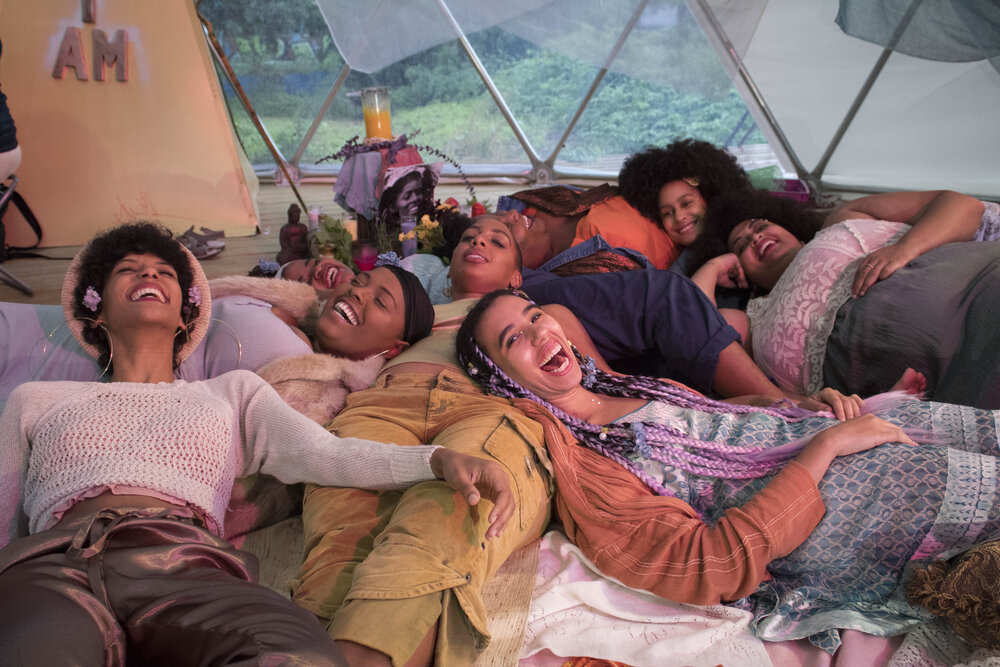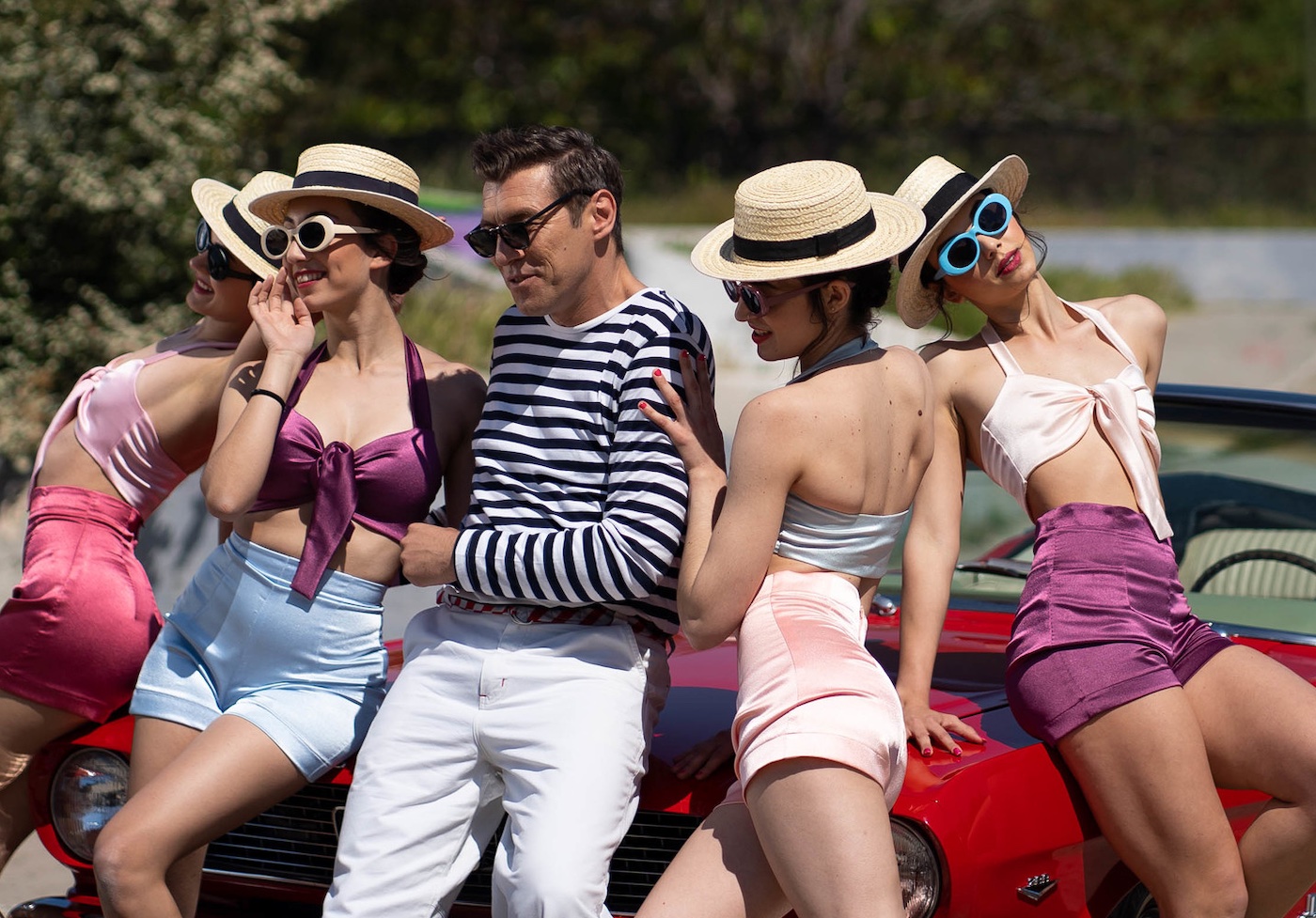Greece may be the sun-kissed cradle of Western culture and a perennial magnet for tourism, but in recent decades it has seldom had a high profile in the film world. During the “golden age” of the 1950s and ‘60s things were somewhat different, as talents like stars Melina Mercouri and Irene Papas, plus directors Michael Cacoyannis and Costa-Gavras, achieved major international recognition. After that, however, a variety of factors contributed to a shrinking of exported features, the most prominent exceptions being later films by late slow-cinema master Theo Angelopoulos and the idiosyncratic, absurdism-inclined Yorgo Lanthimos (though his projects are mostly shot abroad in English these days).
But just because we don’t see many Greek movies at the multiplex doesn’t mean there aren’t interesting ones being made, and the San Francisco Greek Film Festival provides annual proof of that. The current edition is its 18th, taking place Fri/16 through Sun/25 as a free online-only event (though donations are welcome), apart from a single in-person event Sun/18 at San Mateo’s Par 3 drive-in. On that evening, at $40 per carload, you’ll be able to see 2019’s Fantasia, a tuneful dramatic ode to the 1990’s urban folk-music revival scene that is definitely not related to the Disney ‘toon of the same name.
There are no designated official opening or closing night films—all the remaining eleven features and fifteen shorts are available for streaming throughout the festival’s course. Among the more acclaimed full-length titles is Yannis Economides’ Ballad for a Pierced Heart, a long, leisurely yet thoroughly potty-mouthed black comedy-cum-noir in which a cheating wife and stolen loot trigger plans for lethal vengeance on all sides. It takes nearly two hours for the bodies to start piling up, but when they do, they pile high. With nearly every interaction an argument, and even the fugitive lovers frequently at each others’ throats, this deadpan tale of provincial misanthropy is not the kind of enterprise that will have you rushing to book that next Greek vacation.
Likewise offering a rather dark view of humanity, although with considerably less humor, is Syllas Tzoumerkas’ The Miracle of the Sargasso Sea. Scapegoated for the botched investigation of an alleged anarcho-terrorist group, a veteran police detective is forced to relocate with her resentful son to a small town. There, she becomes a particularly foul-tempered (and typically hung-over) police chief whose path crosses that of a luckless woman employed in the local eel-processing factory (uh…yum?) after the latter’s dominating lounge-singer brother turns up dead. This dyspeptic drama is equal parts murder mystery and grim portrait of dead-end lives lashing out.
There’s not much more levity in Iranian director’s European co-production Pari, in which a couple arrive in Athens to visit their son, whom they’d sent to study at university here two years earlier. Not only does he fail to meet them at the airport, it turns out he’s been missing for months—and never even really started his purported studies. Well-meaning fellow Iranians expats they meet assume the boy “lost his way” amongst the “so-called freedoms” of this non-Islamic society. But as the search for him drags fruitlessly on, until Pari’s rigid, controlling husband loses interest, this passive wife and mother begins to become someone else—just as her only child presumably has. It’s an atmospheric tale with a commanding lead performance by Melika Foroutan. Though again, this particular view of Athens (in particular its seamy underside) is not one you’ll find in the guidebooks.
By no means is everything in 2021’s SF Greek Fest so somber. There are also three full-length comedies (Defunct, Tailor, Not To Be Unpleasant But We Need A Serious Talk), And documentaries encompass a wide range of subjects, including monastery portrait Athos, The World’s Highest Peak, grape-based-industry overview In The Wine Dark Sea, music showcase My Rembetika Blues and pogrom flashback The Unlost Homeland. All program and ticketing info is available at sfgff2021.eventive.org.

Another online event coming up shortly is the Tiny Dance Film Festival, which Roxie Virtual Cinema hosts Mon/19-Mon/26. Detour Dance’s selection of dance-focused shorts from around the world embraces experimental, documentary, site-specific performance record, and various other genres. Choreographers, dancers and filmmakers represented reach beyond the U.S. to Romania, Portugal, France, Canada, Japan, Finland and Spain. The two shorts programs will be available for streaming on a sliding scale of suggested donations. On Thurs/22 at 6 pm there will be a a free screening of Eric Garcia’s The Nelken Line, a filmed version of a 1982 Pina Bausch work performed by over two dozen Bay Area drag and queer artistes, followed by a Q&A with several participants. For full info, go to http://www.detourdance.com/tdff.
Highlights among new feature-film streaming releases this weekend:
In the Earth
English writer-director Ben Wheatley has made nine features in the last twelve years without having or even particularly trying for a commercial breakthrough—unless you count last year’s Netflix remake of Rebecca, a for-hire gig he was ill-suited for. Neither his biggest project to date, underrated J.G. Ballard adaptation High Rise, nor the starriest, retro shoot-em-up Free Fire, were exactly hits, while everything else has been more or less arthouse fare. (2018’s Happy New Year, Colin Burstead didn’t even manage to get U.S. distribution.) Nonetheless, he is one of the most interesting genre talents of our era, not least because his eccentric low-to-medium-budget movies invariably have genre elements without ever quite fitting into any one genre pigeonhole.
This latest is no exception, and perhaps even more of a whatsit than usual. It recalls other existential/spiritual sci-fi sojourns from Stalker to Annihilation, with some Altered States-type hallucinogenic imagery thrown in as well. But mostly the British writer-director is referencing himself here, drawing elements from such unclassifiable prior efforts as Kill List and A Field in England to Frankenstein into a new celluloid beast. In the Earth was written and produced during COVID lockdown, something very much worked into its fictive narrative fabric—albeit without this being yet another movie in which the “gimmick” is its being entirely shot via Zoom or some such, thank god.
Joel Fry plays a scientist who after a long mandatory quarantine (there is some other, grave virus afflicting mankind here) reports to a commandeered hunting lodge at the edge of a closed national park. From that point, he is to set off on a two-day foot trek to an even more isolated research outpost, with a park ranger (Ellora Torchia) as guide—something he does need, since he’s obviously not a very outdoorsy type. They soon have some strange experiences in the forest, arriving at a crisis of sorts before meeting a man (Reese Shearsmith) who is apparently living rough here, illegally. His assistance is welcome…at least until it turns out his intentions are not exactly benevolent. The eventual arrival of a fourth major figure (played by Hayley Squires) only further complicates an increasingly fraught situation for our protagonists, who are by turns drugged, held captive, and worse.
But this isn’t a conventional “terror in the woods” horror flick by any means, despite some gore and “pagan ritual” stuff. Just what it is, though, will be a matter of each viewer’s personal conjecture. Wheatley has contrived a murky parable riffing not only on COVID, but also climate change, and all the other things making humanity’s spell on this planet seem like a chapter that might be coming to a close. This trippy tale struck me as a somewhat incoherent rehash of his favorite themes, at once visceral and vague. But it’s always cinematically accomplished, and if taken primarily as a somewhat psychedelic (even specifically psilocybic) audiovisual experiment, it’s striking. Just don’t expect to know exactly what’s happening onscreen, or why. In the Earth opens in theaters Fri/16.
Hope
There’s also a sense of things coming to an end in this Scandinavian co-production from writer-director Maria Sodahl. Only here the extinction event isn’t species-wide: Instead, it’s on the very personal level of middle-aged artist Anja (Andrea Braein Hovig) discovering that the cancer she thought had been eradicated a year ago has in fact spread to her brain, and will almost certainly be terminal within months, perhaps even weeks. This is bad news made worse by the fact that she and longtime partner Tomas (Stellan Skarsgard) have a large brood of children mostly still living with them. The day-by-day chronicle begins just before Christmas, so their coping with the crisis is further complicated because specialists both medical and psychiatric (to advise on how to tell the kids) are on holiday until after the New Year.
This is mostly Hovig’s movie, as her character cycles through a gamut of emotions heightened by headaches (from the tumor), anxiety and sleepless (from the medication). It’s no surprise Anja is often at wit’s end. But given its 130-minute length, the film might have explained her frequent exasperation with Tomas by better defining the faultlines of their relationship—and of his personality, in general. The normally expert Skarsgard (whose sons have turned into stars in their own right) gives an unusually vague performance; is Tomas just emotionally reserved, or does the film mean us to infer things about him that it ought to have simply been spelled out? Nonetheless, this is a well-made, well-acted film whose subject matter guarantees a degree of dramatic power. It’s playing Roxie Virtual Cinema as of Fri/16.
Bill Traylor: Chasing Ghosts
Also new to Roxie Virtual Cinema is Jeffrey Wolf’s documentary about an ex-slave whom one latterday authority calls ““probably the greatest artist you’ve never heard of.” Traylor was born a plantation slave in 1853 Alabama, his family staying there a full forty years after emancipation—leaving only when a new heir turned their hitherto reasonably good situation as tenant farmers too unpleasant to remain. He eventually wound up in Montgomery, where white painter Charles Shannon happened upon him sitting on a street corner in the late 1930s, drawing sketches of animals on scrap paper. Shannon saw something there, giving the elderly man better art supplies, watching as his work grew more complex.
Self-taught, Traylor didn’t even begin creating pictures until he was past 80. Yet his “primitive,” silhouette-like images were full of both symbolic weight and cultural documentation, often depicting details of rural African-American life decades before. Shannon was unable to get much recognition for Traylor in the art world during the latter’s lifetime. But decades later, in the 1970s, he got swept up in a new appreciation for “folk art,” and now holds a posthumous position of some importance in that field amongst latterday curators, critics and creatives.
This documentary suffers from the fact that so little is known about the subject’s life, particularly his earlier decades. No doubt partly to compensate, it makes some questionable stylistic choices: Having onscreen actors narrate his story, a tap dancer strut his stuff in some sequences, etc. At times these elements feel like gratuitous means of stretching the movie to a slim (at 75 minutes) feature length, despite a limited amount of truly relevant material. Still, Traylor’s work itself does have an originality and evocative intensity that you’ll be glad to be introduced to.





You had me at “high wasted satiny shorts.” Nice screen grab.